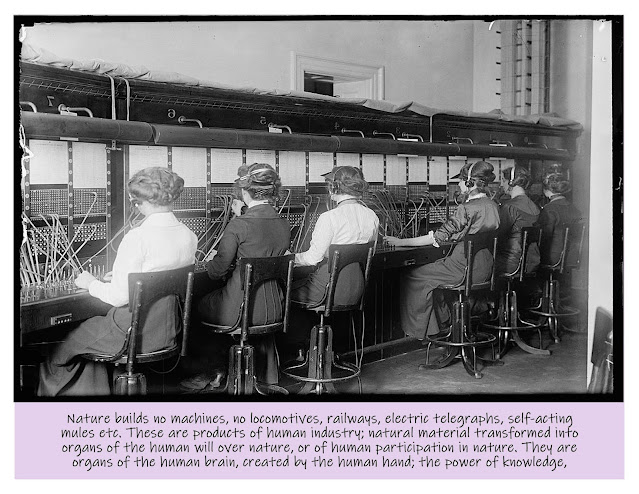Infrastructure week: organs of the human brain, created by the human hand Who owns general social knowledge? Who owns the general intellect? Alf Hornborg pointed out that without the fuel to run it, a tractor is simply a piece of sculpture. It is not even a sculpture, though, if there is no one to design it and build it and operate it, let alone to design and manufacture the tools needed to build the tractor and so on. Marx’s list of things nature does not build, “machines… locomotives, railways, electric telegraphs, self-acting mules etc.” is echoed in the next paragraph, “railways, canals, aqueducts, telegraphs etc.” but this second time explicitly excluding of “the machinery directly active in the direct production process.” Here’s what
Topics:
Sandwichman considers the following as important: Infrastructure, politics, US/Global Economics
This could be interesting, too:
Robert Skidelsky writes Lord Skidelsky to ask His Majesty’s Government what is their policy with regard to the Ukraine war following the new policy of the government of the United States of America.
Joel Eissenberg writes No Invading Allies Act
Ken Melvin writes A Developed Taste
Bill Haskell writes The North American Automobile Industry Waits for Trump and the Gov. to Act
Infrastructure week: organs of the human brain, created by the human hand

Who owns general social knowledge? Who owns the general intellect? Alf Hornborg pointed out that without the fuel to run it, a tractor is simply a piece of sculpture. It is not even a sculpture, though, if there is no one to design it and build it and operate it, let alone to design and manufacture the tools needed to build the tractor and so on.
Marx’s list of things nature does not build, “machines… locomotives, railways, electric telegraphs, self-acting mules etc.” is echoed in the next paragraph, “railways, canals, aqueducts, telegraphs etc.” but this second time explicitly excluding of “the machinery directly active in the direct production process.”
Here’s what happens (sometimes) when one reads, and rereads, and rereads a passage that at first seemed a bit obscure or even incoherent: the two paragraphs (four in the collected works translation) beginning with “Nature builds no machines…” are indispensable to the theory of surplus population and surplus capital. This is the place in the third — and customary — fragment on machines where Marx addressed surplus population. Surplus population is a condition for this:
As the magnitude of relative surplus labour depends on the productivity of necessary labour, so does the magnitude of labour time – living as well as objectified – employed on the production of fixed capital depend on the productivity of the labour time spent in the direct production of products.
Or, another translation, from the collected works:
Just as the amount of relative surplus labour depends upon the productivity of necessary labour, so the amount of the labour time employed on the production of fixed capital—living labour time as well as objectified—depends upon the productivity of the labour time intended for the direct production of products.
Marx is drawing an analogy here between the relationship of necessary labour to surplus labour (relative surplus value) and the relationship of direct production of consumer goods to the production of fixed capital. The input for the first relationship is socially necessary labour time while the analogous input for the second is socially unnecessary labour population — that is, a population that has been freed from the production of necessities because it is no longer necessary.
The surplus value produced by this surplus population is not immediately realizable. It is postponed indefinitely and thus, according to Marx, creates a disproportion between the need for circulating capital and the need for fixed capital, “when sometimes too little, then again too much-circulating capital is transformed into fixed capital.”
And there you have it. Marx’s crisis theory: the production of fixed capital is to the production of consumer goods as the production of relative surplus labour is to the production of necessary labour.
To bring the analogy back full circle to the first paragraph: the production of general social knowledge is to the production of fixed capital as the production of fixed capital is to the production of consumption goods…
Who owns the general social knowledge?
to be continued…
